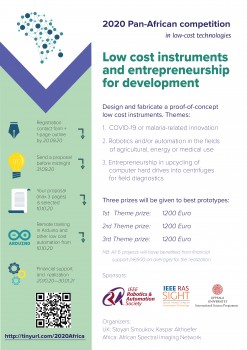News
Queen Mary researchers launch new competition on low-cost innovation for African scientists and entrepreneurs
21 August 2020

Researchers from the School of Engineering and Materials Science at Queen Mary University of London have launched a new competition in low-cost technologies that aims to identify and develop the next generation of young scientists, leaders, and entrepreneurs in Africa. This new competition, which is open to all countries in Africa, will look to build technical and entrepreneurial skills in young scientists, through the design and manufacture of low-cost instruments that address real-world challenges.
Dr Stoyan Smoukov, a Reader in Chemical Engineering at Queen Mary, said: “As electronics become better, smaller and cheaper, there’s lot of opportunity for engineers to develop low-cost innovative solutions that will help change lives across the world.”
“Through this competition we hope to unlock scientific and entrepreneurial potential across Africa, and provide training and support to help these talented individuals to develop cheap and effective solutions for the countries and communities that need them.”
An international panel of experts in applied physics and engineering will select six finalists from the submitted proposals. The finalists will receive some funding and remote training in Arduino and other low cost automation tools to help them design a fully functioning prototype over a period of three months. Three prizes of 1200 euros will then be awarded for the best prototypes in early 2021.
Applicants will be asked to submit for design proposals across the following themes; Covid-19 or malaria-related innovation, robotics and/or automation in the fields of agriculture, energy and medical use, and entrepreneurship in the upcycling of computer hard drives into centrifuges for field diagnostics.
Low-cost innovation creates affordable products and solutions by adopting innovative ways of using existing technologies in to.
Dr Smoukov, added: “At Queen Mary our researchers and students working on several low-cost innovation projects, from flexible manipulators, to remote-controlled 3D printed microscopes, to centrifuges made from discarded hard-drives. (Prof.) Kaspar Althoefer and I teamed up with the AFSIN network in Africa to organize this competition. We’re hoping that this initiative will be the start of a series of projects that will help us to use our engineering expertise to help drive low-cost innovation in developing countries all over the world.”
More information
- Apply for the 2020 Pan-African competition in low-cost technologies. The final submission deadline for proposals is 30 September 2020.
- The competition is sponsored by IEEE Robotics and Automation Society, and the Uppsala University International Science Programme.
| Contact: | Vicky Kwaku |
| People: | Kaspar ALTHOEFER Stoyan SMOUKOV |
Updated by: Vicky Kwaku




